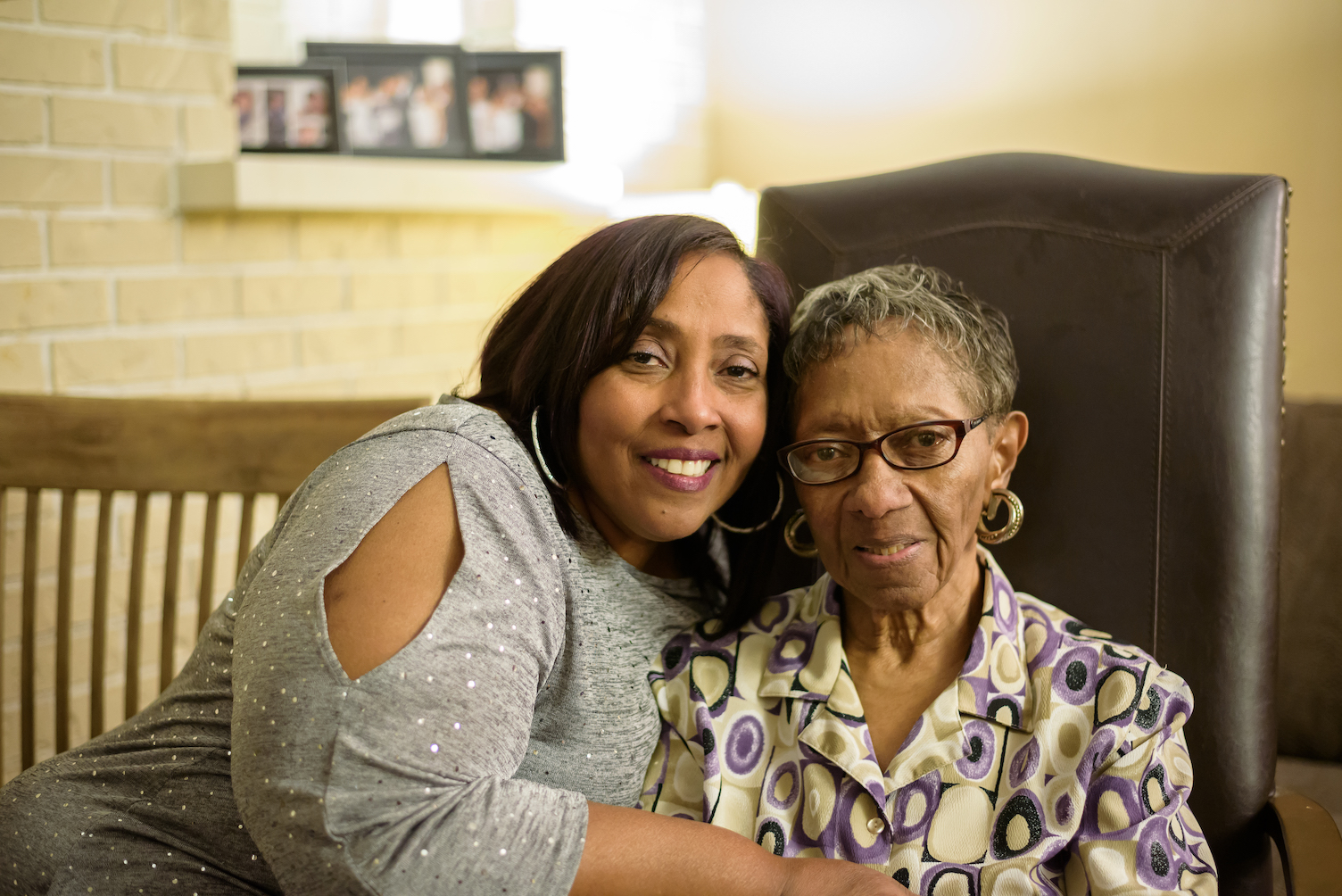Research Shows African Americans with dementia at high risk for COVID-19
Cynthia Moon, right, with her mother, Ella Evans
For more than a year, Cynthia Moon has had hospice care come into her mom's home.
Ella Evans has congestive heart failure, diabetes, high blood pressure, she’s had a stroke — and she has dementia.
When the pandemic hit, Moon said she called the agencies to ensure all the aides were COVID trained and tested. “My mom is so frail, she cannot get sick. The smallest cold could put her in the hospital,” Moon said.
Moon wanted her mom to get the COVID vaccine. But her mother’s doctor did not recommend it. She said “‘there hasn’t really been any studies conducted with all the issues my mom has’….I don’t want my mom to get COVID, nor do I want her to get the vaccine and it could be bad for her. I just stay prayed up. God’s going to protect her.”
Then Moon decided to follow her heart. She and her son transported Ms. Evans, who is bedbound, to get her first vaccine dose. She’s weighing whether to go forward with the second dose because of the side effects she has heard people talk about after receiving the second dose.
New research shows that African Americans with dementia are at a significantly increased risk of contracting COVID. A study published Feb. 9 by Case Western Reserve University in Alzheimer’s & Dementia: The Journal of the Alzheimer’s Association found that the odds of contracting COVID-19 were twice as high for patients with dementia compared to those without dementia. African Americans with dementia had close to three times the risk of being infected with COVID-19 as white individuals with dementia.
Researchers used electronic health record data from 61.9 million American adults. While this is the first paper focused on the COVID risk faced by those with dementia, the published paper said the study highlights the need to protect individuals with dementia, especially those who are African American, as part of the strategy to control the pandemic.
In Ohio, dementia is not a current qualifying condition for priority vaccination. But individuals 65 and older, which comprises most people with Alzheimer’s, can be vaccinated now.
COVID, just like Alzheimer’s disease, impacts African Americans more severely. According to the Johns Hopkins Coronavirus Resource Center, although racial and ethnic information is currently available for only about 35 percent of the total deaths in the United States, the data shows that African Americans and other historically disadvantaged groups’ infection and death rates are disproportionately high. For example, while black people represent about 13 percent of the population in the states reporting racial/ethnic information, they account for about 34 percent of total COVID-19 deaths in those states.
“We know how dementia disproportionately impacts African Americans and Hispanics. Now you add the risks and outcomes of COVID-19 and it is devastating. This pandemic continues to highlight the inequities in health outcomes,” said Eric VanVlymen, Ohio Regional Leader for the Alzheimer’s Association.
Karen D. Gorman Jones is well aware of the magnitude of health challenges African Americans face. “Everybody else gets a cold, we get the flu. They get the flu, we get pneumonia,” she said. Gorman Jones, who is the primary caregiver for her mother Inez Gorman, who is 91, said she was hesitant at first about getting the vaccine for her. “But every vaccine that came out I got. I grew up getting vaccinated. I made sure my children got vaccinated,” she said. So, her mom, who has Alzheimer’s disease, received the vaccine and she will get it also when she can.

Terri Littlejohn with her mother, Dorothy Crane
Terri Littlejohn’s mother, Dorothy Crane, lives with her and her husband Randall Littlejohn. When she and her husband Randall both got infected with COVID, Terri Littlejohn was hospitalized and Randall, whose symptoms were not as severe, stayed home and took care of Mrs. Crane, who has Alzheimer’s. Terri was determined that her mother was going to get the vaccine. In fact, while she was still in the hospital, she said she made calls to get Mrs. Crane an appointment.
Mrs. Crane, who so far has escaped the virus, got her first dose while Terri Littlejohn was hospitalized. “She cannot get COVID,” she said. “We choose life. We want our mother not to be sick as we were,” she said.
Editor's Note: The Alzheimer’s Association has a dedicated web page with information about the vaccine for dementia caregivers and people living with Alzheimer’s disease.
• • •• • •













